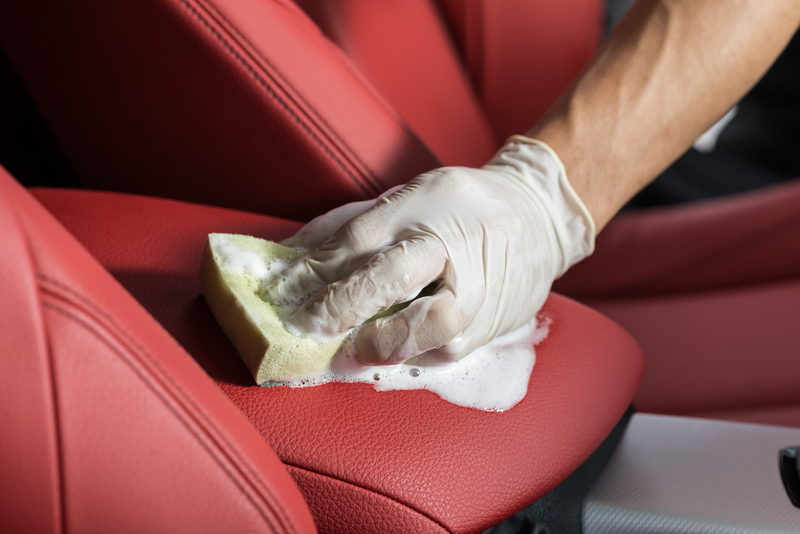Refreshing Your Living Space: No More Pet Odors
Posted on 07/10/2025
Refreshing Your Living Space: No More Pet Odors
If you are a proud owner of a dog, cat, or rabbit, you know how much joy pets bring to your life. However, pet odors can sometimes take the joy out of sitting in your own home. Whether it's the lingering scent of wet fur, accidental piddle marks on the carpet, or the faint whiff from a litterbox, unwanted smells may leave you wondering how to keep your living space truly inviting. In this comprehensive guide, we'll dive deep into techniques and tips for eliminating pet smells and refreshing your living area for a welcoming, odor-free environment.

Understanding the Source of Pet Odors
Before jumping into solutions, it's vital to understand where pet odors originate. By knowing the source, you can apply targeted cleaning methods that are most effective in removing stubborn smells and preventing them from returning.
Common Sources of Pet Odors
- Accidents: Pets, especially young or elderly ones, may have accidents on carpets, rugs, or upholstery, resulting in odors that stick around.
- Dander and Fur: Pet dander, a combination of dead skin cells and fur, not only triggers allergies but can also build up and hold onto smells.
- Litter Boxes and Cages: Improperly maintained litter boxes, cages, or enclosures can quickly lead to overpowering odors in the home.
- Pet Beds and Blankets: Your pet's favorite resting place absorbs their unique scent over time.
- Wet Dogs: A classic culprit, the wet dog smell is caused by bacteria reacting to moisture on fur and skin.
These sources, if not addressed, can persist even in the cleanest homes. Let's explore how to conquer each challenge and achieve a refreshing living space free from pet odors.
Top Tips for Eliminating Pet Odors at Home
1. Regular Cleaning Is Essential
The cornerstone of refreshing your living space is maintaining a regular cleaning routine. Thorough cleaning routines not only banish existing odors but also prevent their buildup.
- Vacuum frequently: Use a vacuum with a HEPA filter to remove pet hair, dander, and dust from floors, upholstery, and draperies. Aim for at least twice per week in living areas and daily in high-traffic zones.
- Launder fabrics: Wash pet beds, throw blankets, and removable cushion covers at least every two weeks. A touch of white vinegar in the wash cycle helps neutralize stubborn smells.
- Wipe surfaces: Use pet-safe cleaning wipes or sprays on hard surfaces like floors and furniture, especially around your pet's spaces.
2. Deep Clean Carpets and Upholstery
Carpets and soft furnishings can be magnets for pet odors. Even the highest quality vacuum can't reach deep into fibers where urine or dander might be trapped. Periodic deep cleaning is the key to true odor elimination.
- Rent or invest in a carpet cleaner: Steam cleaning or using a carpet shampooer at least once a season will help lift embedded smells and stains.
- Use enzymatic cleaners: When dealing with urine accidents, enzyme-based cleaners break down odor-causing molecules at the source, rather than covering up the scent. Apply liberally and let air dry for best results.
- Try DIY solutions: Sprinkle baking soda generously over the carpet before vacuuming. Baking soda is a natural odor absorber and works wonders for refreshing your living room.
3. Freshen Air Naturally
Instead of masking odors with heavy fragrances, opt for natural air freshening strategies. These not only keep the air smelling clean but also contribute to a healthier home environment.
- Open windows regularly: Even in cooler months, cracking a window for a few minutes a day facilitates air exchange, reducing pet odors indoors.
- Use air purifiers: An air purifier with a HEPA filter and activated carbon layer captures airborne dander, allergens, and volatile odors.
- Place bowls of vinegar or coffee grounds: These common household items can absorb and neutralize odors from the air. Leave a bowl near your pet's area overnight for noticeable freshness.
- Houseplants: Certain plants like spider plants and peace lilies can improve air quality and naturally help with pet odor reduction.
4. Address Litter Boxes and Pet Bathrooms
For cat owners and those with indoor rabbits or other small pets, litter box management is critical.
- Scoop daily: Remove waste from litter boxes every day to stop odors before they start.
- Change litter regularly: Deep clean and replace litter at least once a week. Wash the box with hot water and mild soap to remove lingering smells.
- Use odor-absorbing litters: Clumping litter with carbon or activated charcoal can significantly reduce ammonia and other unpleasant smells.
- Strategic placement: Place litter boxes in well-ventilated, low-traffic areas -- never next to vents or windows, which can spread odors throughout your home.
5. Wash and Maintain Pet Accessories
Don't let toys, collars, and leashes be overlooked! These can hold onto dirt, saliva, and oils that eventually create funky odors.
- Weekly washes: Run washable toys, collars, and fabric leashes through the laundry. Non-washable items should be wiped down with a damp cloth and pet-safe cleaner.
- Replace worn items: Toss out accessories that become excessively soiled or retain odors after cleaning.
6. Groom Your Pets Regularly
A clean pet equals a cleaner home. Good grooming not only keeps your companion healthy but minimizes the spread of dirt and dander.
- Bathe as needed: Dogs benefit from a monthly bath or as recommended by your vet, while cats typically keep themselves clean. Use gentle, pet-formulated shampoos to avoid irritating sensitive skin.
- Brush frequently: Regular brushing reduces shedding and spreads natural oils, promoting a healthy coat and lessening odor.
- Wipe paws: After walks, wipe your pet's paws to remove dirt and bacteria.
Preventing Pet Odors: Best Habits to Keep Your Home Fresh
Proactive steps can make odor control virtually effortless. Integrate the following routines for long-lasting freshness:
- Establish designated pet areas: Keep beds, toys, and litter away from main living areas. This contains potential odors and simplifies cleanup.
- Use washable, odor-resistant fabrics: Choose machine-washable cushion covers and pet beds made from materials that resist odor absorption.
- Spot-clean accidents immediately: Quick action prevents odors from setting in. Keep enzyme cleaners on hand for emergencies.
- Professional deep-cleaning: Schedule annual or semi-annual cleanings for carpets and upholstery, especially before allergy season or when guests are expected.
- Diet and health: Sometimes, a lingering odor may signal health issues such as dental diseases or digestive problems. Regular vet checks and a balanced diet help minimize unpleasant smells at the source.
DIY Pet Odor Removal Solutions That Work
Tried-and-True Home Remedies
You don't always need to rely on commercial products. Here are classic home remedies that can tackle a variety of smelly pet problems:
-
Baking Soda Carpet Freshener:
- Sprinkle generous amounts on carpets and fabrics.
- Let it sit for 15-30 minutes to absorb odor, then vacuum well.
-
White Vinegar and Water Spray:
- Mix equal parts in a spray bottle.
- Lightly mist onto affected areas (test for color fastness first).
- Let air dry. The vinegar scent dissipates, taking bad smells with it.
-
Hydrogen Peroxide Spot Remover:
- Mix 1 part hydrogen peroxide, 1 part dish soap, and 2 parts water for stubborn urine spots.
- Apply to stains, let sit, then blot and rinse well.
- Use only on colorfast surfaces; always test first!
- Lemon juice: Natural citrus acids cut through greasy odors. Add to water when mopping or freshening surfaces.

Advanced Solutions: When to Call the Professionals
Sometimes, pet odors persist despite your best efforts. Particularly severe, set-in smells may require a professional touch:
- Ozone treatments: Special machines can purify air at the molecular level, removing particles that ordinary cleaning misses. Not recommended for use while people or pets are present, but highly effective for tough cases.
- Professional deep cleaning: Companies specializing in pet odor restoration use industrial-grade cleaners and extraction equipment for carpets, upholstery, and air ducts.
- Laundry services: For items too large for home machines (like area rugs or comforters), professional laundering restores freshness.
Maintaining a Fresh, Welcoming Home: Final Thoughts
Refreshing your living space and saying goodbye to pet odors doesn't mean sacrificing your pet's happiness or changing your lifestyle. With a blend of prevention, regular maintenance, and smart cleaning strategies, it is possible to enjoy the best of both worlds: a home that celebrates your furry family -- but not their smells!
- Stick to your cleaning schedule, address issues promptly, and don't be afraid to ask for help with stubborn spots.
- Remember, the cleaner your pet, their accessories, and their environment, the fresher and healthier your home will be.
- Choose products and remedies that are safe for both pets and people.
By following these tips on eliminating and preventing pet odors, you can welcome guests with confidence and enjoy your space to the fullest -- without having to worry about lingering smells ever again. Happy cleaning!




